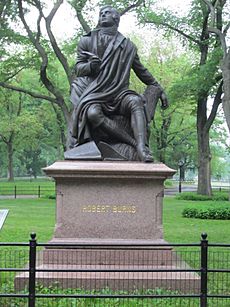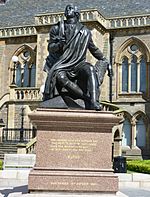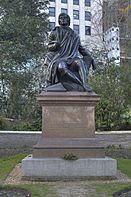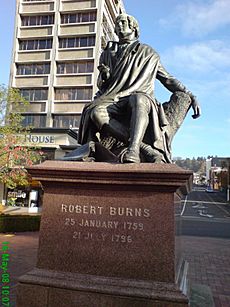Robert Burns (Steell) facts for kids
Quick facts for kids Robert Burns |
|
|---|---|
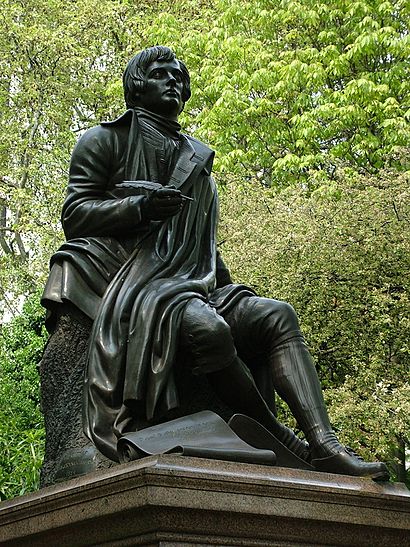
The sculpture in London in 2006
|
|
| Artist | John Steell |
| Type | Sculpture |
| Medium | Bronze |
| Subject | Robert Burns |
| Location | Dundee, Dunedin, London, New York City |
The Robert Burns statue is a bronze sculpture of Robert Burns. He was a very famous Scottish poet. The statue was created by John Steell. There are four copies of this statue around the world. You can find them in New York City (USA), Dundee (Scotland), London (England), and Dunedin (New Zealand).
Contents
Statues of Robert Burns
These statues honor Robert Burns. He is one of Scotland's most beloved poets. His poems and songs are still popular today.
New York City Statue
The first statue of Robert Burns outside Scotland was placed in Manhattan's Central Park. It was made around 1880 and officially revealed on October 2, 1880. This statue was a gift to New York City. It came from the Saint Andrew's Society of the State of New York and Scottish-Americans.
For this statue, John Steell used a painting of Burns from 1787. The statue shows Burns sitting on a tree stump. He holds a quill pen and looks up. He is thinking of Mary Campbell, a special person in his life. A poem he wrote for her, "To Mary in Heaven," is on a scroll at his feet.
Statues in Scotland and England
The statue in Dundee, Scotland, was revealed just two weeks after the New York one in 1880. The third statue was put up in London, England, in 1884. This one is located on the Thames Embankment.
Dunedin Statue in New Zealand
The last of these statues was revealed in Dunedin, New Zealand, on May 24, 1887. A statue of Burns was important to Dunedin for two reasons. First, the city was founded by Scottish settlers in 1848. Second, one of the city's founders, Rev. Thomas Burns, was the poet's nephew.
The Dunedin statue looks most like the one in London. People discussed where to put it. They chose an elevated spot in The Octagon. This is the central area of Dunedin.
Miss Burns, a great-grand niece of Robert Burns, revealed the statue. Important people gave speeches. These included Sir George Grey, a former Governor and Premier of New Zealand. The Mayor of Dunedin, Richard Henry Leary, also spoke.
The statue is a popular spot for public speeches. It stands on what is now called McMillan Terrace. On July 27, 1988, the New Zealand Historic Places Trust officially recognized the statue. It is a special Category I heritage structure.
 | Sharif Bey |
 | Hale Woodruff |
 | Richmond Barthé |
 | Purvis Young |


